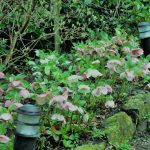A stunned gardener told of his shock after discovering a raspberry bush covered in fruit – more than FIVE months early.
Stunned Steve England could not believe his eyes when he spotted the bush drooping with bright red berries.
He believes the mild weather has caused plants to think that spring has come early, encouraging them to blossom five months earlier than usual.
The horticulturist said that the warm winter, or extended autumn, has also encouraged wild garlic, apples and lilies to grow earlier than expected .
He said: “One of the first things we spotted was the Arum Lily, also called the Lords and Ladies, and it should be fast asleep at the moment.
“Then we came across some wild garlic beginning to grow.
“We carried on our walk but we were all stopped in our tracks when we saw a raspberry bush with lots of bright red fruits.
“We all had a single refreshing and tasty out of season raspberry and went home full of the joys of spring.
“The trees are also completely laden with apples – I’ve never seen anything like it.”
Steve England, from Bristol, was leading a wildlife walk through a local park when he made the discoveries.
He said that he was initially shocked by the birds, who were singing spring songs, but soon discovered plants blossoming months earlier than expected.
The amateur naturalist said that the plants had been tricked by the mild winter, but added that when the cold sets in it will have disastrous consequences.
He said: “The reason for this happening is that we are experiencing a warmer autumn and the wildlife will respond accordingly.
“They are all being tricked into thinking that spring has arrived early.
“It’s all down to the soil temperature. Regardless of the time of year as soon as the soil temperature reaches 16 degrees and above seeds will start to germinate and grow.
“Sadly when we do experience cold temperatures, and we will, the plants that have sprouted will be killed off by the frost.
“Then they will not re-grow again until next spring.




